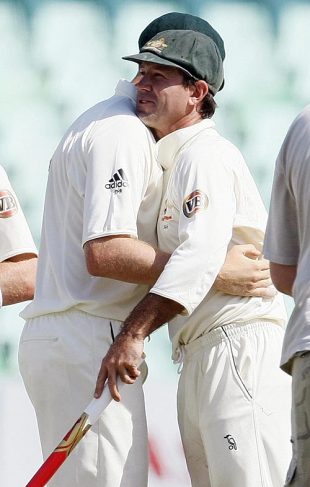|
|
|

Ponting has captained Australia for five years but only now, with a new generation at his
command, does he have the chance to create his own distinct legacy for the next captain
© AFP
|
|
| |
The headwear gave them away.
Ricky Ponting and Phillip Hughes sat
together after Australia's win in Durban and the most obvious sign of
the generational gap that divides them was the state of their baggy
green caps. Ponting's was battered and faded, a victim of
sweat-drenched toil and booze-soaked celebrations from 130 largely
successful Tests. Ponting's was baggier but Hughes' was,
appropriately, greener.
Whereas Hughes' cap - one of ten handed out over the past year - has
seen only the eastern half of South Africa during the past two weeks,
Ponting's has travelled the world for nearly 14 seasons. It has been
sprayed with so much beer that it must smell like a bar-room
dishcloth. Most of those celebrations came with a familiar group of
faces: Shane Warne, Glenn McGrath, Adam Gilchrist, Justin Langer,
Matthew Hayden, Damien Martyn, to name just a few.
It was a squad that Ponting inherited from Steve Waugh who, in turn,
had accepted it from Mark Taylor and, before him, Allan Border. It was
a group that struck fear into the hearts of those who faced it and
forged the greatest cricketing dynasty Australia has known. It was a
squad that, over the past few years, eroded steadily with each
retirement.
The departures of so many luminaries left Ponting with the youngest
and most inexperienced side he has ever led. Ponting has captained
Australia for five years but only now, with a new generation at his
command, does he have the chance to create his own distinct legacy for
the next captain. The "Ponting Age" has truly begun.
The loss to South Africa in Australia this season was the end of an
era. Australia had not been defeated in a home series for 16 years.
Through most of that period they were unquestionably the world's best
side. The beginning of the end of that era came in the 2006-07 Ashes
when Warne, McGrath, Langer and Martyn all retired. Gilchrist departed
a year later. The loss of Hayden this summer left Ponting as the only
link to the full stretch of Australia's glory days.
It has forced a change in Ponting's leadership style. Where once he
was criticised for captaincy by consensus, turning to the likes of
Warne, Gilchrist and Hayden for advice, now he is demonstrably in
charge in every aspect of Australia's on-field performances. There are
fewer committee meetings on the ground. Ponting directs traffic with
the confidence of a policeman.
His authority extends beyond the field. During the net sessions in the
lead-up to the Kingsmead Test it was notable that Ponting stood in the
umpire's position and watched every one of his new bowlers and batsmen
with an analytical eye, handing out advice when required and
presumably confirming in his mind who he wanted in the side.
Those decisions haven't been as easy of late. During the glory days of
what is sometimes known as the Warne-McGrath era, the team picked
itself. All the selectors had to do was cut and paste the squad from
the last match and if there was an injury, throw in the man who had
been next in line. Now things are far less simple.
Phillip Hughes, Marcus North, Ben Hilfenhaus and Andrew McDonald are
not names that most observers would have expected 12 months ago to be
in the Australian Test side. It has meant an enormous challenge for
Ponting.
"It's certainly a unique phase in my career as a captain," Ponting
said. "To have a number of debutants, and a number of inexperienced
guys in the side, it's something I haven't been accustomed to in the
majority of my career as a captain. I've said right from the start,
that when these challenges come up and this transitional phase first
started, I always looked at as being one of the most exciting little
phases of my career.
"Being the captain of the side when I was, when we were so dominant,
Test series and Test matches seemed to roll into one another. We were
winning everything that came along and we were expected to win
everything that came along. If you look at our group of players [now]
… a lot of people around the world didn't think that this was
achievable."
It has helped that Australia entered this match with an unchanged side
for the first time in 16 Tests. Following the controversial home
series against India in early 2008, the squad rarely looked settled
throughout the remainder of the year. Now Ponting is in charge of a
group of men who have been told their roles and are keen enough and
capable enough to perform to specifications.
Players like Hughes, Hilfenhaus, Peter Siddle and Doug Bollinger could
have ten-year careers ahead of them. They are without question
benefiting from starting their careers under a leader who believes in
them and is willing to persist with them. Five years into his
captaincy, Ponting is finally starting to leave his own unique mark on
the Australian team.
Brydon Coverdale is a staff writer at Cricinfo
